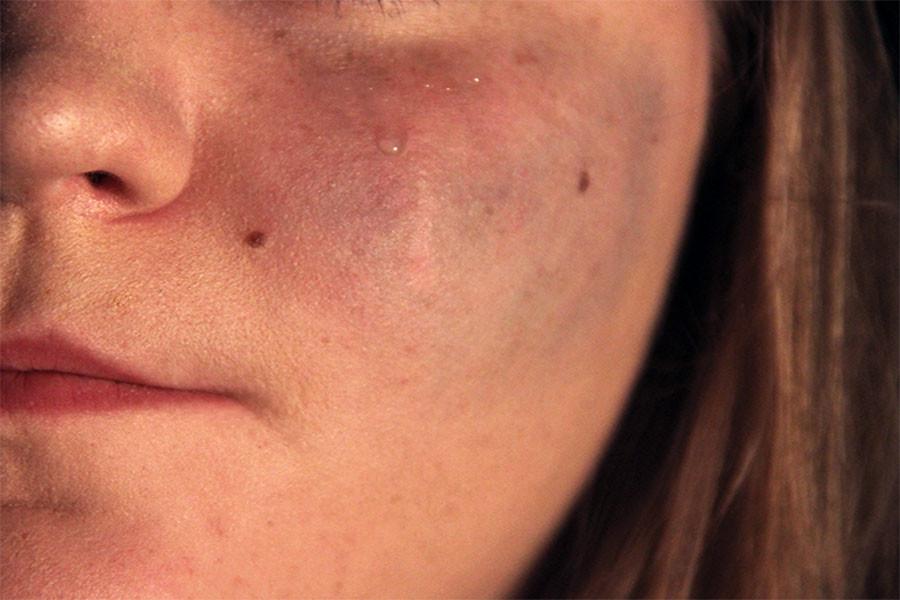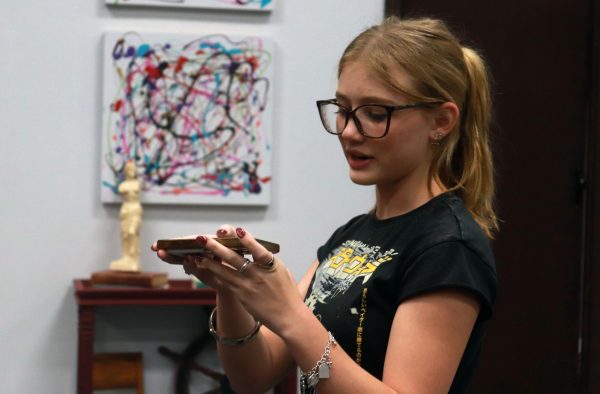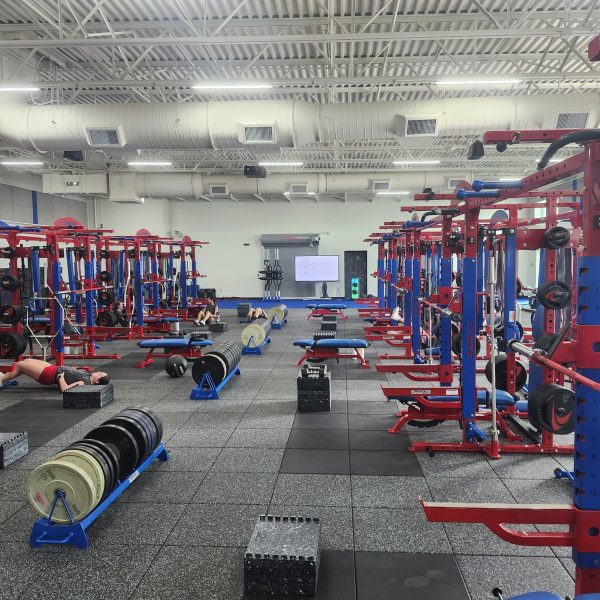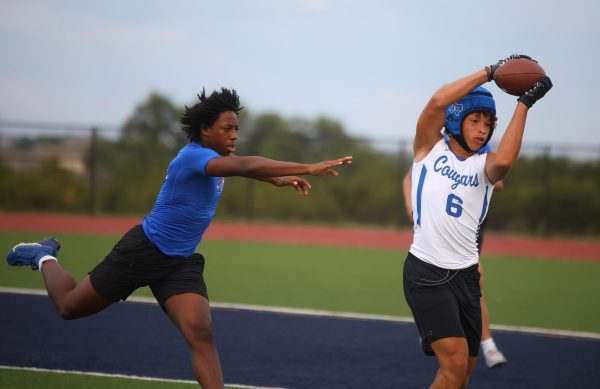Breaking the cycle of abuse
Students, Teachers raise awareness on dating violence
Abuse isn’t always physical; it’s emotional, verbal, and psychological. As of 2014, 1/3 teens who were involved in an abusive relationship confided in someone about the violence.
One Teacher’s Story
Before she was Mrs. Bell, she was just Danielle, a freshman in high school. Her crush was a popular football player, and he sat two seats behind her in World History. They would smile at each other every day, until he handed her a note one day saying she was cute. They talked every day for two weeks on the phone, sat together all the time at lunch, and then, he asked her out; her first relationship.
“I didn’t think of anything as abuse at first,” Bell said. “I had never had a boyfriend before him, and I thought all of the things he did were sweet or protective or cute. He would tell me how to wear my hair, because it made my neck and shoulders look pretty. He would say I didn’t need to wear makeup because I was naturally beautiful. He wanted me to only wear jewelry he bought me or that was his. He would ask me tons of questions about my day, and I thought he just was interested in me or how my day went.”
Then, slowly, things changed between them.
“But then he started demanding that I wear my hair a certain way, belittling me if I wore makeup and asking me who I was trying to impress, and telling me he didn’t want me to sit by guys in class or even talk to guys, including my little brother’s friends,” she said. “He followed me everywhere, went through my backpack every day and made me write him a note every single class period. If I broke any of those rules, he would pout, give me the silent treatment, drill me with questions, accuse me of cheating/lying.”
A Long Lie
Most abusive relationships last longer than most people expect.
“He never hit me or was physically aggressive until two and a half years into the relationship,” Bell said. “By then, he had complete control of me. I didn’t do anything without his approval, and I had basically shut myself off from every friend I had ever had. He was my entire world and I planned how I would behave, what I would wear, and tried to anticipate any situation that would make him angry.”
But the marks never showed, on Bell’s body or her face.
“I hid it well,” Bell said. “I never let on there was a problem to my friends, my teachers, my family. I smiled and acted like it was all normal and happy. We looked – on the outside – like #relationshipgoals. I made sure that no one knew. I distanced myself from my friends and spent all of my time with him, so no one could have the opportunity to question me.”
This went on for four years – four years of accusations, pain and suffering, but it continued for the most innocent reason.
“It went on for four years because I loved him,” Bell said. “He had a lot of struggles growing up and a lot of his family had left him at some point. I believed I could save him, that I wouldn’t be one more person who abandoned him. I believed I could change him, and that he really loved me and he would be a good man one day.”
One night, the violence escalated, and he choked her by holding her by the throat against a door. Her brother found out when he came home in the middle of it, and a confrontation between them ended the physical abuse. He didn’t hit her after that.
After graduation, he enlisted in the Air Force and was in both Texas and Louisiana, and she went to college in East Texas. They carried on their relationship via letters and phone calls for a few months, but a trip to visit him over a long weekend ended in tears, arguing and accusations of cheating. It was like nothing had changed and she couldn’t take it anymore.
On January 19, 1999, Bell ended it.
“I had completely changed in those 6 months after high school,” Bell said. “Once he wasn’t in my face every day, I realized I was actually my own person. I reexamined my life and decided I was going to be who I was meant to be.”
The Setup
The relationship begins, fast paced and seemingly in-love.
“It all started when I’d been single for about a year after a long relationship that had lasted about two years,” an anonymous student said. “One night I mentioned I was going to Wild West with a bunch of my girlfriends. I’m out dancing and we go to sit down (to) play pool and I hear someone say, ‘is that you?’ He surprised me at Wild West and we two-stepped the rest of the night. I’d never danced with someone like that before and I’d never felt that way.”
For two months, neither said a word to each other. Then, he showed up.
“I ditched school for him assuming he’d been alone, but when I got out there he had his friend and another girl in the truck,” anonymous female student said. “We’re in the backseat, his friend is driving, and he’s back there trying to make out with me and trying to take my clothes off. I’m telling him to stop this whole time and his friends eventually tell him to cut it off.”
Just as quickly as it began, it turned into violence.
“He walks me up to the porch acting nice, saying goodbye, and before I went inside he grabbed my head and aggressively said, ‘I love you, I just want you; Don’t ever embarrass me like that again,'” she said. “And he slaps me. I started to cry and he told me not to, so I stopped. I went back inside like nothing had happened.”
These two dated for about a year until the young woman ended it.
“I met him in a parking lot at a halfway point between where we both lived,” anonymous female student said. “He put me up in his lifted truck and he basically tried to rape me, but I started crying and pushed him off. I thought I loved him so much that I’d do anything to make him happy, but that was the last time he’d put his hands on me. I drove off with him trying to chase me.”
All About Control
In an abusive relationship, one partner controls the other. They control what they wear, who they see, what they say, what they do. They take control of when things begin, and when they end.
Why Does it Continue?
Most people ask why the victim of such a relationship lets the abuse go on for so long, but for some, they think they’re in love. For one teacher’s college friend, she blamed herself. She would be beaten by her boyfriend in the parking lot of their living quarters.
“We would call the police, [and] get her inside,” anonymous female teacher said. “We would physically get him off of her and get her in the house and lock the doors. Invariably, she would run to the door and try to let him in. [She would say] ‘I’ve got to let him in. I’ve got to tell him I’m sorry. I’ve got to apologize. I shouldn’t have done this, I shouldn’t have said that.'”
Lasting Effects
Once the ‘relationship’ ends, though, it isn’t over. For some, it’s never over.
“It took me a long time to do something as simple as wear a short-sleeved shirt, or to not look over my shoulder if I heard a male voice say ‘hello,'” Bell said. “I was always looking for him, thinking of how mad he would be if he saw me talk to a guy or wear a skirt. When (my husband) and I first started dating, I would constantly flinch when he would touch me. I would tell him everything I had done that day, who I had seen or talked to, every detail. Then he told me that he completely trusted me. It took me a long time to believe someone could love me and not make me feel awful every day.”
Lessons Learned, Prevention
Prevention begins with identification. Being able to identify a situation is half of the battle. Warning signs include: verbal abuse, keeping track of a person’s schedule, regulates who a person sees/talks to, controls aspects of a person’s life (controlling clothing, actions), threats of violence, and more.
“I learned (after many years) that this type of abuse was common especially among teenagers,” Bell said, “I decided I’d never be embarrassed or ashamed of what I’d done and that instead, I’d share my story with my students. If I can help one of them get out of a relationship like mine, it’s worth it to share.”
April is Sexual Assault Awareness month, and this includes unhealthy relationships, dating abuse, date rape and rape. The month has been deemed so because it is important for men, women, students and young adults to understand the warning signs, dangers and lasting effects of sexual abuse and violence.If you or a loved one is being sexually abused, call: National Domestic Violence Hotline 1-800-799-7233 or 1-800-787-3224(TTY), Texas Department of Family and Protective Services 24-hour Family Violence Hotline 1-800-252-5400, Love is Respect Helpline 1-866-331-9474 or 1-866-331-8453, or Texas Advocacy Project Family Violence Legal Line 1-800-374-HOPE (4673).
For more information on how to help someone in an abusive relationship or showing signs of one, please visit Band Back Together. To report any activity to the school that qualifies as abuse, bullying, or something administrators should be aware about, please visit Anonymous Alerts.
Editor’s Note: This story focuses on violence with male-female relationships, but that in no way means that they are the only ones to suffer from abuse. This is meant to raise awareness to students and community members on a subject that is closer than it appears. The stories mentioned in this article are real. Some sources have elected to remain anonymous. That decision has been respected, so any names given are used with permission from the source.
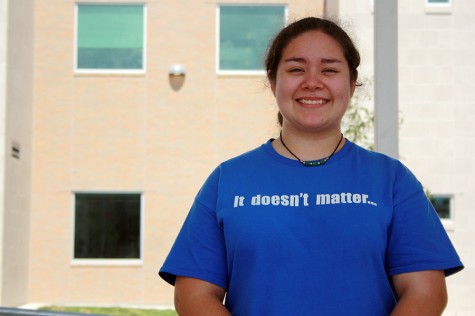
Siandhara Bonnet, Editor-In-Chief, is an ecstatic senior with a full calendar. Along with her passion for Journalism, Siandhara keeps her schedule busy...


